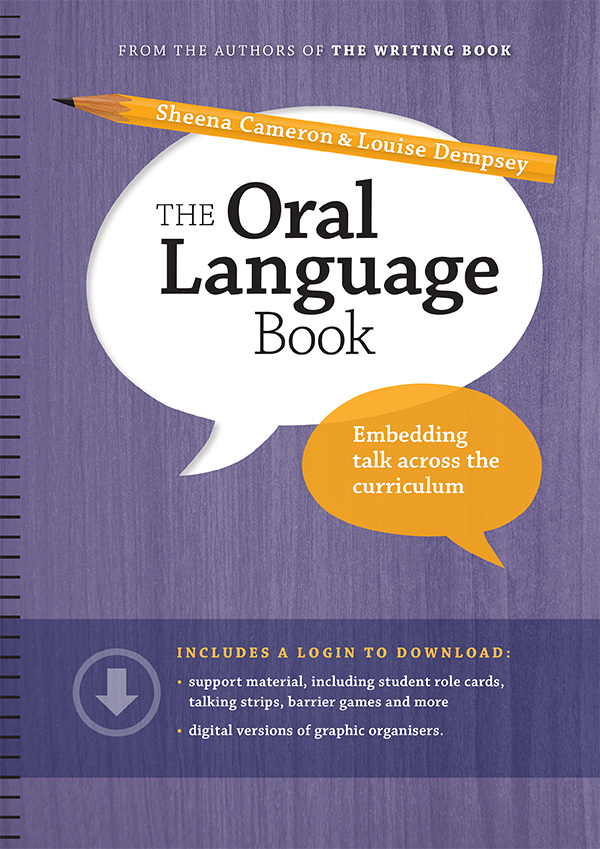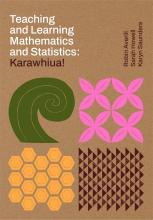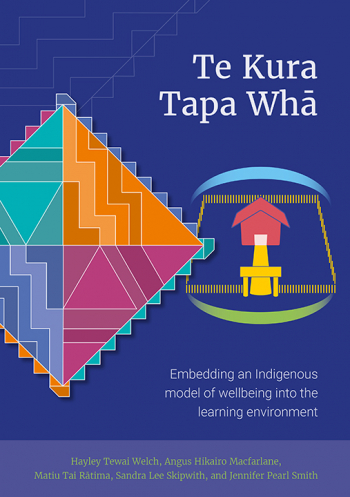Education Primary Pasifika
Resources for individual first year papers
The Child in the Community
-
Key Competencies, assessment and learning stories by Davis, K., Carr, M., Wright, J., & Peters, S This resource booklet and accompanying DVD were developed in response to a strong interest in the use of Learning Stories in schools. They are designed to answer some common questions asked by teachers. In the DVD, teachers and students at a number of schools in Christchurch, New Zealand, talk about their ideas and experiences as they explore different ways to assess the Key Competencies in The New Zealand Curriculum. The resource booklet sets out five workshops to encourage more teachers to do more talking and take action
Dewey Number: 370.711 DAVPublication Date: 2013
-
 The Writing Book: A Practical Guide for Teachers
by
S Cameron & L Dempsey
Guide to teaching writing at emergent, early and fluent levels. It includes practical information that will support primary and middle school teachers to plan and deliver an effective writing programme
Dewey Number: 372.623 CAMPublication Date: 2013
The Writing Book: A Practical Guide for Teachers
by
S Cameron & L Dempsey
Guide to teaching writing at emergent, early and fluent levels. It includes practical information that will support primary and middle school teachers to plan and deliver an effective writing programme
Dewey Number: 372.623 CAMPublication Date: 2013 -
 The Oral Language Book
by
S Cameron & L Dempsey
This practical book outlines strategies and ideas which will support teachers to include more quality "learning talk" in their programmes and embed purposeful oral language opportunities across the curriculum.
Dewey Number: 372.623 CAMISBN: 0473350394Publication Date: 2016
The Oral Language Book
by
S Cameron & L Dempsey
This practical book outlines strategies and ideas which will support teachers to include more quality "learning talk" in their programmes and embed purposeful oral language opportunities across the curriculum.
Dewey Number: 372.623 CAMISBN: 0473350394Publication Date: 2016 -
Teaching Reading Comprehension by A Davis
Dewey Number: 372.47 DAVISBN: 0790319942Publication Date: 2007 -
Child and Adolescent Development for Educators, Second Edition by Christine B. McCormick; David G. Scherer This accessible text--now revised and updated--has given thousands of future educators a solid grounding in developmental science to inform their work in schools. The book reviews major theories of development and their impact on educational practice. Chapters examine how teaching and learning intersect with specific domains of child and adolescent development--language, intelligence and intellectual diversity, motivation, family and peer relationships, gender roles, and mental health. Pedagogical features include chapter summaries, definitions of key terms, and boxes addressing topics of special interest to educators. Instructors requesting a desk copy receive a supplemental test bank with objective test items and essay questions for each chapter. (First edition authors: Michael Pressley and Christine B. McCormick.) New to This Edition *Extensively revised to reflect a decade's worth of advances in developmental research, neuroscience, and genetics. *Greatly expanded coverage of family and peer relationships, with new content on social-emotional learning, social media, child care, and early intervention. *Discussions of executive function, theory of mind, and teacher-student relationships. *Increased attention to ethnic-racial, gender, and LGBT identity development. *Many new and revised practical examples and topic boxes.
Dewey Number: OnlinePublication Date: 2018
Who Will I Be When I Am A Teacher?
-
Quality of Teaching in Years 4 and 8 Health and Physical Education Report made by the Education Review Office in 2007
-
Culture counts : changing power relations in education by R. Bishop & T Glynn
Dewey Number: 379.93 BISPublication Date: 2011 -
Whaiora by Mason Durie This book documents progress in Maori health development over the past century with a special emphasis on the last fifteen years. This second edition updates the first by five years and takes account the changing government objectives for Maori health and Maori priorities for healthdevelopment.
Dewey Number: 362.84994 DURPublication Date: 1998 -
Promoting Health in Aotearoa NZ by L. Signal & M. Ratima (Eds.) Promoting Health in Aotearoa New Zealand is the first comprehensive text on health promotion in New Zealand. Primarily written for students, practitioners and policy makers in the health sector, it will be of interest also to those promoting health in Maori, Pacific Island and other NGOs and to those in government agencies. This book will also have wider relevance to an international audience concerned with promoting the health of indigenous peoples. The contributors come from a wide range of backgrounds and experience, offering different perspectives using a range of theories and approaches.
Dewey Number: OnlinePublication Date: 2016
Introduction To Pacific Principles In Teaching Practice
-
Tangata o te moana nui : the evolving identities of Pacific peoples in Aotearoa /New Zealand by Macpherson, Cluny.; Spoonley, Paul. & Anae, Melani
Dewey Number: 305.8994093 TANPublication Date: 2000
-
Tangata O le Moana by Sean Mallon (Editor, Introduction by); Kolokesa Mahina-Tuai (Editor, Introduction by); Damon Salesa (Editor); Claudia Orange (Foreword by) This richly illustrated history tells the fascinating story of Pacific people and their relationships with, and contributions to, New Zealand society. Across fifteen chapters written by leading historians and writers, every aspect of New Zealand’s relationship with Pacific people is covered #150; from migration to tourism, economics to politics, sport to the arts.
Dewey Number: 305.800993 TANPublication Date: 2012
How Can We Explain Learning?
-
Science Learning Hub The Science Learning Hub – Pokapū Akoranga Pūtaiao links New Zealand scientists with school students, teachers and community audiences. Our 10,582 resources showcase cutting-edge science and demonstrate how the stories of science can be used to enrich school teaching and learning, making it more relevant, engaging and meaningful
-
Constructing your primary school's science curriculum : confident, connected, lifelong learners : what's science got to do with it? by A Bull., C Joyce, & R Hipkins
Dewey Number: 372.35044 BULPublication Date: 2014 -
Creative Teaching in Primary Science by Roger L. Cutting; Orla Kelly Creative teaching has the potential to inspire deep learning, using inventive activities and stimulating contexts that can capture the imagination of children. This book enables you to adopt a creative approach to the methods and content of your primary science teaching practice and confidently develop as a science educator. Key aspects of science teaching are discussed, including: planning for teaching and learning assessing primary science cross-curricular approaches the intelligent application of technology sustainability education outdoor learning Coverage is supported by illustrative examples, encouraging you to look at your own teaching practice, your local community and environment, your own interests and those of your children to deepen your understanding of what constitutes good science teaching in primary schools. This is essential reading for students on primary initial teacher education courses, on both university-based (BEd, BA with QTS, PGCE) and schools-based (School Direct, SCITT) routes into teaching. Dr Roger Cutting is an Associate Professor in Education at the Institute of Education at Plymouth University.Orla Kelly is a Lecturer in Social, Environmental and Scientific Education in the Church of Ireland College of Education.
Dewey Number: 372.35044 CUTPublication Date: 2014 -
Teaching Primary Science Constructively by K Scamp & C Preston
Dewey Number: 372.35044 TEAPublication Date: 2015
Engaging With Learners And Learning
-
 Teaching and learning mathematics and statistics : karawhiua!
by
Averill, Robin; Howell, Sarah, and Saunders, Karyn.
"This essential handbook is a must-have for anyone teaching mathematics and statistics in Aotearoa New Zealand, from student teachers to experienced educators. It offers a comprehensive resource for both primary and secondary school teachers, filled with classroom-ready activities designed to engage diverse learners and foster positive mathematics mindsets.
Dewey Number: 372.720993 AVEPublication Date: 2025
Teaching and learning mathematics and statistics : karawhiua!
by
Averill, Robin; Howell, Sarah, and Saunders, Karyn.
"This essential handbook is a must-have for anyone teaching mathematics and statistics in Aotearoa New Zealand, from student teachers to experienced educators. It offers a comprehensive resource for both primary and secondary school teachers, filled with classroom-ready activities designed to engage diverse learners and foster positive mathematics mindsets.
Dewey Number: 372.720993 AVEPublication Date: 2025 -
Mathematics Explained for Primary Teachers by Derek Haylock This Fourth Edition of Derek Haylock′s much loved textbook has been fully revised and restructured to match the current Attainment Targets for mathematics in England. Every chapter is written in a way that integrates children's learning, classroom practice and the teacher's own requirements for subject knowledge, making this the ideal text for primary PGCE courses. Features in the new edition include: two new chapters on mathematics in the primary curriculum and learning to learn mathematics more prominence given to using and applying mathematics sections matching the attainment targets for mathematics more learning and teaching points highlighted throughout the text further material on number, risk, use of ICT, graphs and data-handling. a research focus in every chapter. Additional online supportThe companion website provides a glossary and additional material to enable primary trainees to prepare with confidence for the ITT Numeracy test, and provides details of how each chapter of the book is linked to the National Curriculum. This will be updated to reflect any updates to the National Curriculum as they are introduced. You can also follow Derek Haylock′s blog and Twitter feeds to discuss and share issues, news, policy and anything primary maths related!-Visit the companion website: www.uk.sagepub.com/haylock-Review Derek′s blog: http://derek-haylock.blogspot.co.uk/-Follow Derek on Twitter: https://twitter.com/derek_haylock Extensively used on primary PGCE courses and undergraduate courses leading to QTS, this bestselling book is an essential resource for all trainee primary teachers. A companion Student Workbook is also available, which: provides self-assessment activities for students to check their understanding of key concepts helps students to practise key mathematical processes and to apply mathematics in real-life situations gives opportunities to apply their knowledge to teaching and learning.
Dewey Number: 372.7 HAYPublication Date: 2010 -
Teaching primary mathematics by Booker, G., Bond, D., Sparrow, L., & Swan, P.
Dewey Number: 372.7044 BOOPublication Date: 2014 -
Teaching Primary School Mathematics and Statistics by Robin Averill; Roger Harvey Here is the only reference book you will ever need for teaching primary school mathematics and statistics. It is full of exciting and engaging snapshots of excellent classroom practice relevant to The New Zealand Curriculum and national mathematics standards. There are many fascinating examples of investigative learning experiences, and key research- and practice-based ideas about teaching learning and assessment. The writers are among New Zealand's leading researchers and teacher educators. It is a valuable resource for those working in initial teacher education, a marvellous tool for new graduates, has a place in every primary school and will quickly become dog-eared
Dewey Number: 372.7044 TEAPublication Date: 2010
The New Zealand Curriculum: A Vision For Children's Learning In Aotearoa
Culturally Responsive Teaching
-
Niho taniwha : improving teaching and learning for ākonga Māori by Riwai-Couch, Melanie
Dewey Number: Online and 371.82999442 RIWPublication Date: 2021 -
 Te kura tapa whā : embedding an indigenous model of wellbeing into the learning environment
by
Welch, Hayley Tewai, Macfarlane, Angus H., Ratima, Matiu Tai, Skipwith, Sandra Lee, Smith, Jennifer Pearl
Te Kura Tapa Whā is a framework for culturally responsive action. It combines the original work of Tā Mason Durie's Te Whare Tapa Whā, the principles set out in Ka Hikitia: Accelerating Success 2013-2017 and Ka Hikitia, Ka Hāpaitia, and the noted locatives of runga, raro, roto, and waho that have a regular place in Māori prose and poetry
Dewey Number: 370.1170993 WELPublication Date: 2021
Te kura tapa whā : embedding an indigenous model of wellbeing into the learning environment
by
Welch, Hayley Tewai, Macfarlane, Angus H., Ratima, Matiu Tai, Skipwith, Sandra Lee, Smith, Jennifer Pearl
Te Kura Tapa Whā is a framework for culturally responsive action. It combines the original work of Tā Mason Durie's Te Whare Tapa Whā, the principles set out in Ka Hikitia: Accelerating Success 2013-2017 and Ka Hikitia, Ka Hāpaitia, and the noted locatives of runga, raro, roto, and waho that have a regular place in Māori prose and poetry
Dewey Number: 370.1170993 WELPublication Date: 2021
Professional Practice And Inquiry 1
-
Technology education in New Zealand : a guide for teachers by W.H. Fox-Turnbull, E. Reinsfield, & A.M. Forrett This book aims to develop understanding of technology education in New Zealand. It is New Zealand's story of technology education in the 21st Century and will assist teachers and teacher educators develop technology education programmes.
Dewey Number: 371.33 FOXPublication Date: 2021 -
Technology Education for Teachers by P. John Williams (Volume Editor) This is a textbook for use in technology teacher training and also a reference book for technology teachers. It will provide a foundation for new teachers entering the area of technology, and also the opportunity for practicing teachers to keep up to date with research informed ideas about teaching technology.
Dewey Number: OnlineISBN: 9462091617Publication Date: 2013
Library and Learning Services
Te Puna Mātauranga
Private Bag 94006, Manukau, Auckland
Ph: Direct (09) 968-8777
Te Puna Mātauranga
Private Bag 94006, Manukau, Auckland
Ph: Direct (09) 968-8777
Manukau Institute of Technology and UNITEC |
- Last Updated: Dec 1, 2025 12:28 PM
- URL: https://library.manukau.ac.nz/education_primary_pacific
- Print Page

